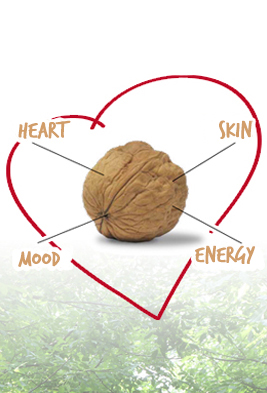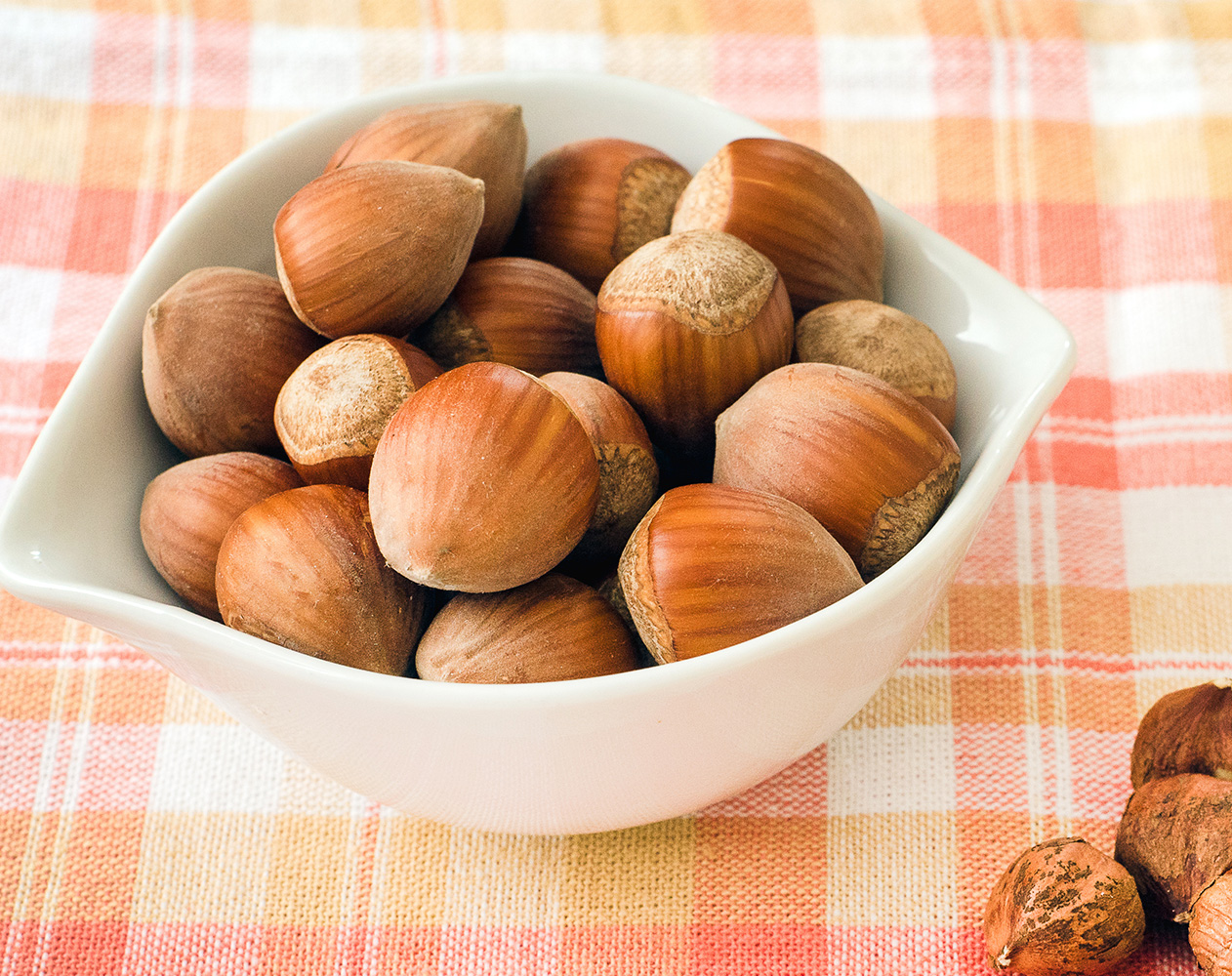Walnuts and health

Natural energy
We’ve known for many years that walnuts are rich in various elements which bring different benefits as part of a healthy, balanced and varied diet. Medical studies conducted all over the world have carefully analysed the benefits walnuts bring to human health, with interesting results in a variety of areas, from the cardiovascular system to the nervous system, the skin to the muscles.
Good for your heart…
Regular moderate consumption of walnuts (around 30 g per day) has been shown to contribute to reducing cardiovascular risk. Specifically, the walnut’s natural richness in Omega-3 and Omega-6 promotes blood vessel elasticity and helps keep cholesterol levels under control. More precisely, replacing saturated fatty acids in our diet with unsaturated fatty acids (monounsaturated and polyunsaturated), in which walnuts are particularly rich, reduces LDL cholesterol (Low Density Lipoprotein), the so-called “bad” cholesterol, and increases HDL cholesterol (High Density Lipoprotein), the “good” cholesterol in our blood. Walnuts also contain significant amounts of thiamine (vitamin B1), which contributes to normal cardiac function, and potassium, a mineral salt that plays an important role in regulating blood pressure.(1)
A friend of your skin…
It’s a well-known fact that antioxidants help to prevent cardiovascular disease, and also offer beneficial effects for our skin. Walnuts contain a significant quantity of vitamin E, copper and zinc, which help to protect our cells against oxidative stress (preventing cell aging). It’s no coincidence that in the cosmetic sector, walnut oil has long been used as an ingredient in many emollients, moisturisers and anti-aging products.(2)
A champion of wellbeing…
Thanks to the high levels of mineral salts they contain, eating walnuts can improve our health and wellbeing in many ways. Phosphorous, copper, magnesium and iron play an important role in energy metabolism; magnesium and potassium contribute to normal muscle function and magnesium and iron reduce fatigue and tiredness. And that’s not all, studies on aging have also shown that walnuts, thanks to their iron and zinc content, play a part in maintaining normal cognitive function. Copper, iron and zinc contribute to the normal functioning of the immune system, while potassium, magnesium and copper help keep our nervous system running smoothly.
Epidemiological studies have also identified a connection between the regular consumption of walnuts and a reduced risk of diabetes, in particular diabetes mellitus type 2, and, more generally, of metabolic syndromes (suggesting the opportunity for further study), especially in relation to Omega-3, Omega-6, and to the presence of unsaturated fatty acids.(3)
Average nutritional values per 100 g of edible product:
| Energy | 2.934 kJ / 711 kcal | |
| Fats | 69 g | |
| saturates | 6,8 g | |
| monounsaturates | 9,5 g | |
| polyunsaturates | 53 g | |
| inoleic acid (OMEGA-6) | 44 g | |
| linolenic acid (OMEGA-3) | 8,7 g | |
| Carbohydrates | 2,7 g | |
| sugars | 2,5 g | |
| Fibres | 6,3 g | |
| Protein | 16 g | |
| Salt | 0 g | |
| Vitamins and mineral salts | in % del RDA(*) | |
| Vitamin E | 3000 µg | 25,0% |
| Thiamine | 0,45 mg | 40,9% |
| Potassium | 360 mg | 18,0% |
| Phosphorous | 380 mg | 54,3% |
| Magnesium | 131 mg | 34,9% |
| Iron | 2,1 mg | 15,0% |
| Zinc | 2,7 mg | 27,0% |
| Copper | 1,5 mg | 150,0% |
*RDA= European Union Recommended Daily Allowance for vitamins and minerals
Hazelnuts and our health
Similarly to walnuts, thanks to their unsaturated fat content, studies have also shown hazelnuts to be of benefit to our health, particularly in preventing cardiovascular disease and maintaining normal levels of blood cholesterol. Epidemiological studies show that hazelnuts, like other nuts, contain a complete range of nutrient and, as part of a balanced diet, provide an important source of energy without affecting body weight.(4)
After all, we all know how important it is to follow a healthy, balanced diet, with plenty of vegetables, as part of a healthy lifestyle.
Average nutritional values per 100 g of edible product:
| Energy | 2.614 kJ / 633 kcal |
| Fats | 56 g |
| saturates | 3,8 g |
| monounsaturates | 35 g |
| polyunsaturates | 4,0 g |
| Carbohydrates | 8,5 g |
| sugars | 4,8 g |
| Fibres | 9,7 g |
| Protein | 19 g |
| Salt | 0,03 g |
1 Sources: N Engl J Med 2013; 369: 2001-11. Angiology, 2005 Sep-Oct; 56 (5): 581-3. J Med Food, 2011 Sep; 14 (9): 890-8. Am J Clin Nutr, 2009 Jul; 90 (1): 56-63.
2 Sources: Br J Nutr; 2008 Feb; 99 (2): 447-8.
3 Sources: Coates A.M., Howe P.R, Edible nuts and metabolic health, Curr. Opin. Lipidol, 2007; 18: 25–30. California walnuts, Nutrition and scientific research, a resource guide for health professionals, Folson CA, www.walnuts.org. Nutr J, 2008 May 2; 7: 13.
4 Sources: Br J Nutr, 2008 Feb; 99 (2): 447-8. Arch Intern Med, 2002 Jun 24; 162 (12): 1382-7.



 0131.887213
0131.887213 Carrello
⟨0⟩
Carrello
⟨0⟩












